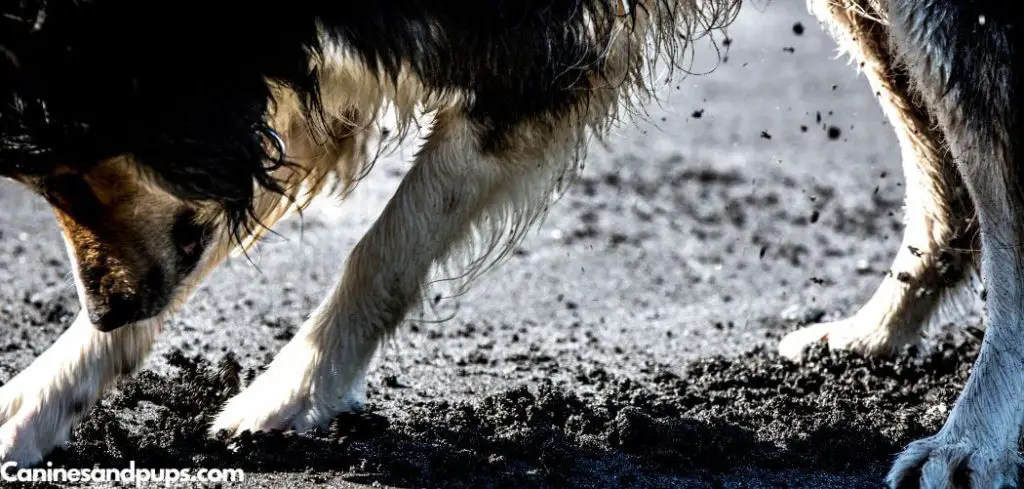It can be confusing to see your dog panting and digging at night, especially when the rest of the house is calm and quiet.
This behavior often leaves owners wondering if it’s a sign of anxiety, discomfort, or something more serious.
We outline the common reasons why a dog may pant and dig during the night, what you can do at home to help them settle, and when it’s best to seek veterinary advice.
Dog Panting and Digging at Night — Why It Happens
When a dog is panting and digging at night, it can be confusing and stressful for owners. These behaviors may be linked to anxiety, discomfort, heat, or underlying health conditions.
Panting often signals stress or overheating, while digging may reflect restlessness, pain, or an instinctive attempt to create comfort.
When both symptoms occur together during nighttime, it often means something is disturbing your dog’s ability to relax and sleep.

Dog Panting and Digging at Night: Common Causes
Anxiety or Stress
Dogs may pant and dig at night when they are anxious or stressed. Panting is a natural response to heightened stress levels, while digging can be a compulsive behavior triggered by restlessness.
This often happens during thunderstorms, fireworks, or when a dog has separation anxiety.
If your dog seems unable to settle, paces, or hides along with panting and digging, anxiety may be the driving cause. Left untreated, stress can affect sleep quality and overall well-being.
Read more: Dog Panting and Digging After Giving Birth (What it means)
Heat or Overheating
Panting is the primary way dogs regulate their body temperature, and digging can be an instinctive attempt to find a cooler spot.
At night, especially in warmer climates or during summer, your dog may struggle to cool down indoors.
This leads to panting combined with restless digging in bedding or on floors. Overheating at night is not just uncomfortable but potentially dangerous if it escalates toward heat exhaustion.
Pain or Discomfort
Dogs experiencing pain, such as from arthritis, digestive issues, or an injury, may become restless at night.
Panting often signals discomfort, and digging may represent a dog’s attempt to find a position or place that eases the pain.
For example, a dog with joint stiffness may dig into bedding to create support, while panting shows the effort of coping with discomfort.
If pain is the root cause, your dog may also whine, pace, or have difficulty settling down.
Digestive Upset
Stomach issues like bloating, gas, or indigestion can cause restlessness at night. Panting may reflect abdominal discomfort, while digging may occur as your dog attempts to ease their belly or distract themselves from discomfort.
Dogs with digestive upset might also lick their lips, drool, or try to eat grass. Nighttime restlessness linked to panting and digging is a strong indicator that something internally is bothering your pet.
Environmental Disruption
Changes in the environment, like new pets, moving furniture, or unfamiliar smells, can make a dog unsettled at night.
Panting shows nervous energy, while digging is a response to feeling insecure or trying to re-establish comfort.
Even something as simple as outside noises can trigger these behaviors. In such cases, panting and digging may resolve once the environment feels familiar and safe again.
Canine Cognitive Dysfunction (Senior Dogs)
Older dogs with cognitive decline may develop restlessness at night, often pacing, panting, and engaging in repetitive behaviors like digging.
This is sometimes referred to as canine dementia. Dogs with this condition can become confused, anxious, and have disrupted sleep cycles, leading to more nighttime activity.
Panting and digging in senior dogs during the night may be one of the early signs of this progressive condition.
What to Do If Your Dog Is Panting and Digging at Night
If your dog is panting and digging at night, first try to identify any obvious triggers. Ensure their environment is cool, calm, and comfortable.
Provide fresh water, comfortable bedding, and a quiet place away from household noise.
For anxious dogs, consider calming routines such as gentle play, soft background music, or a white-noise machine.
Digestive issues can sometimes be eased by adjusting feeding times or portion sizes. If your dog is older, providing orthopedic bedding can reduce nighttime discomfort.
You should also pay attention to patterns. If the behavior only occurs during storms or loud noises, anxiety may be the primary cause.
If it is linked to heat, cooling mats or fans may help. But if panting and digging persist with no clear trigger, or are paired with other worrying symptoms, veterinary evaluation is necessary.
When to Call or Visit Your Vet
If your dog’s nighttime panting and digging become frequent, intense, or disruptive, veterinary care is advised. Seek immediate help if panting is heavy and unrelenting, especially if paired with drooling, weakness, or vomiting.
Dogs that show signs of pain, such as limping, whining, or refusing to lie down, should also be examined.
Older dogs displaying new nighttime restlessness may require evaluation for cognitive dysfunction or other age-related illnesses.
If your dog has digestive symptoms like bloating, retching, or diarrhea along with panting and digging, contact your vet without delay.
Read more: Dog Panting and Digging Bed (Causes explained)
Key Takeaway
Panting and digging at night in dogs can be caused by anxiety, heat, pain, digestive issues, environmental changes, or even age-related conditions. While some causes are temporary or manageable at home, others may signal health problems requiring veterinary care.
By observing your dog’s behavior closely and providing comfort, you can often ease their restlessness.
But if the symptoms are persistent or severe, professional guidance is the safest path to ensure your dog gets restful nights and stays healthy.
